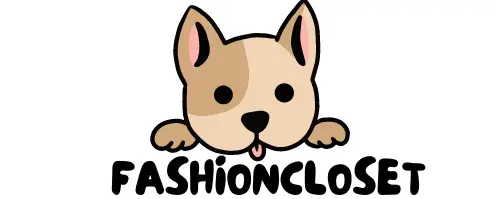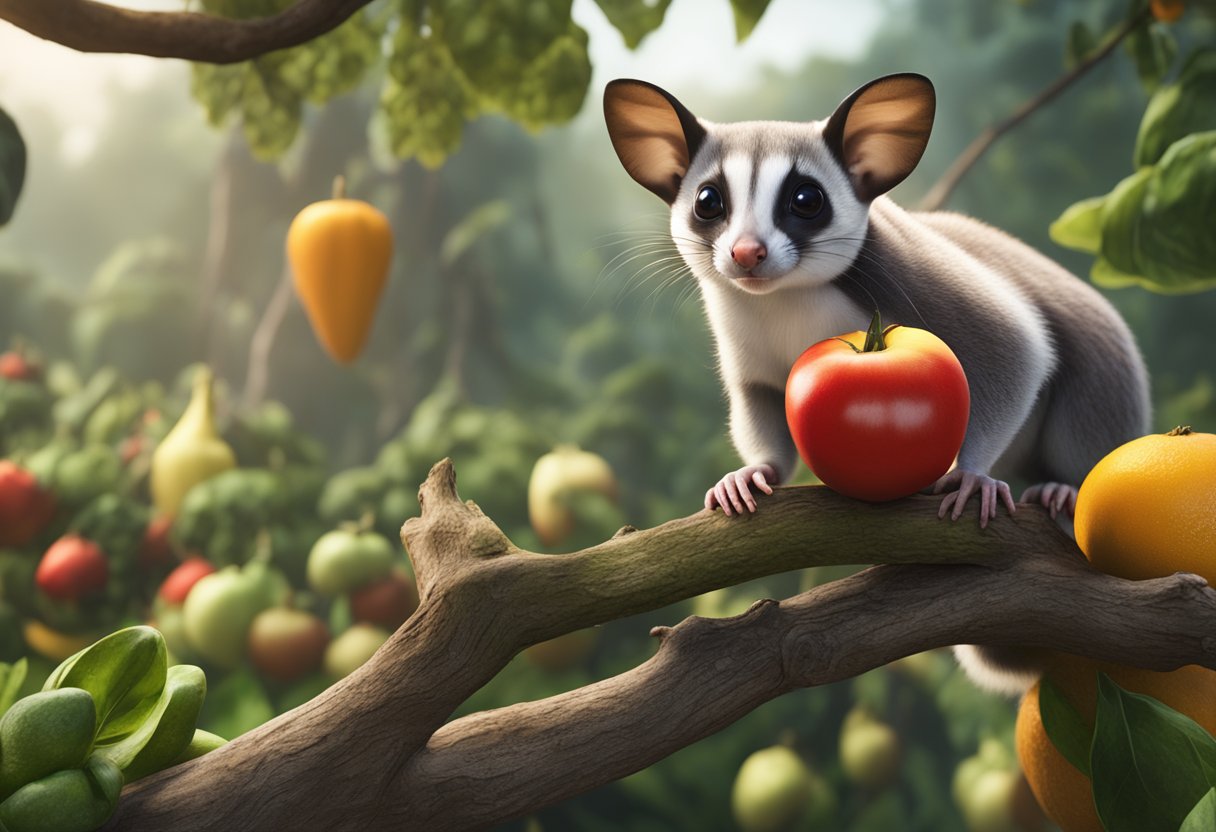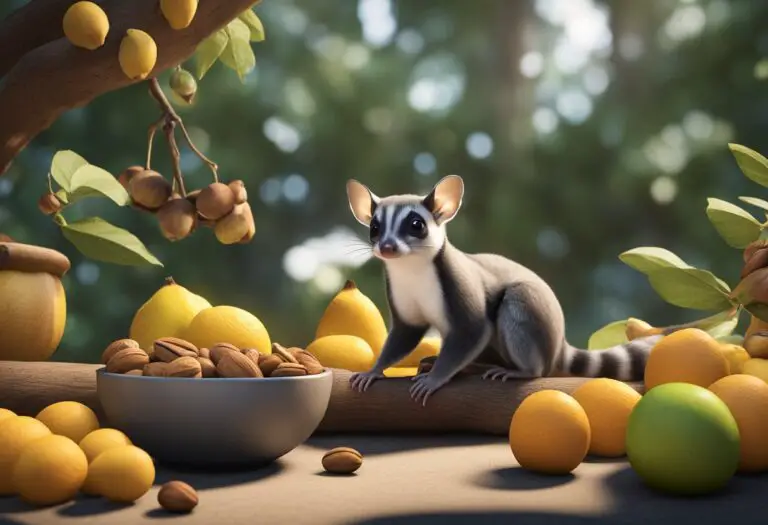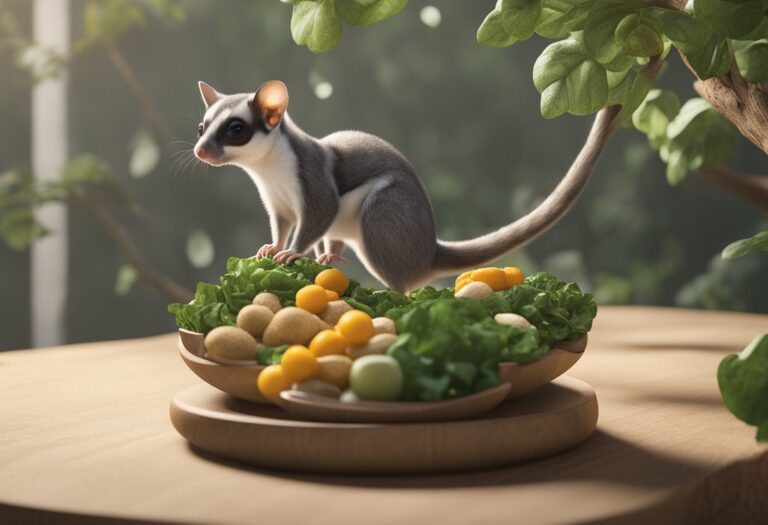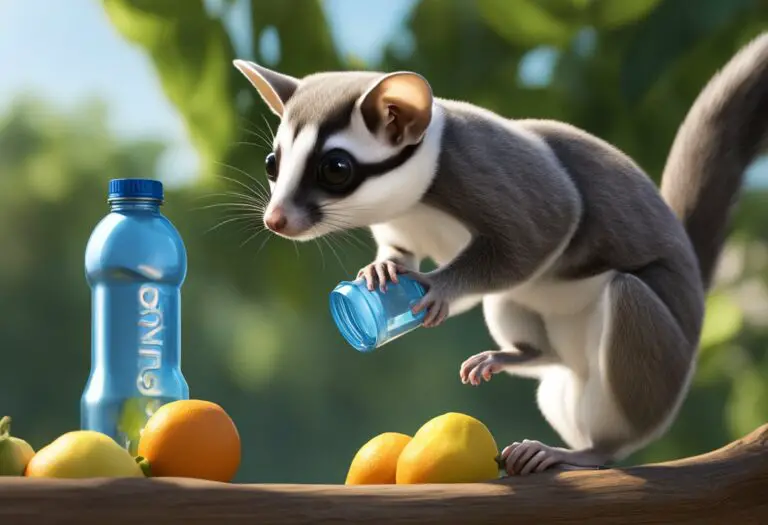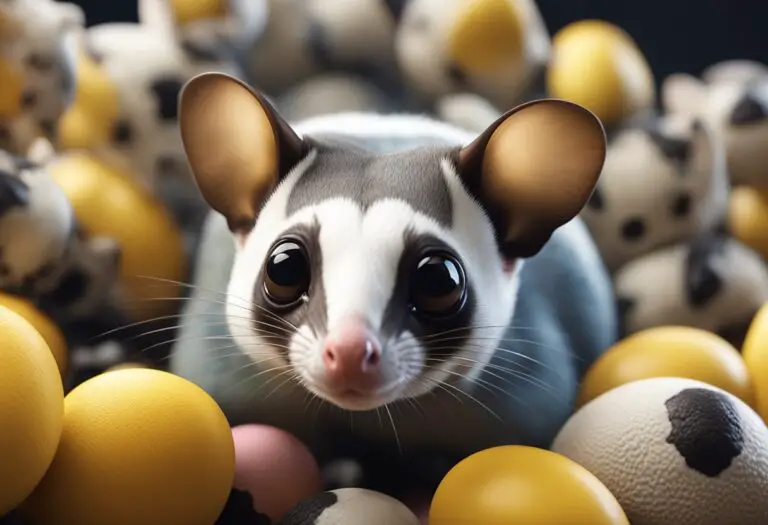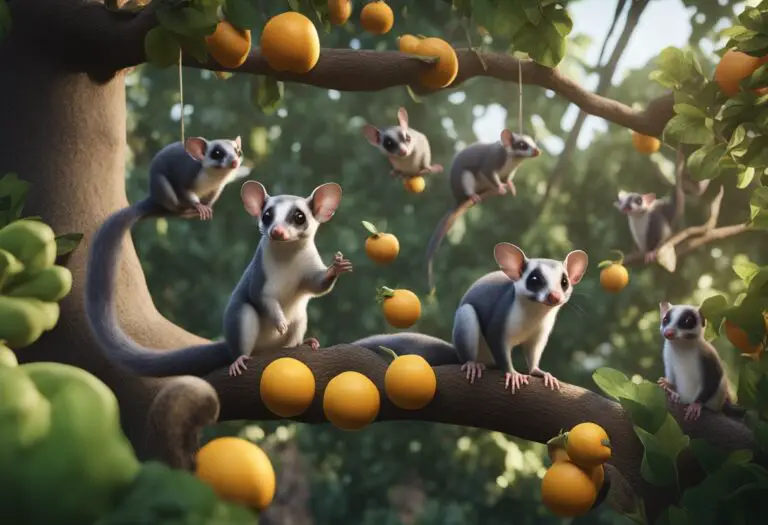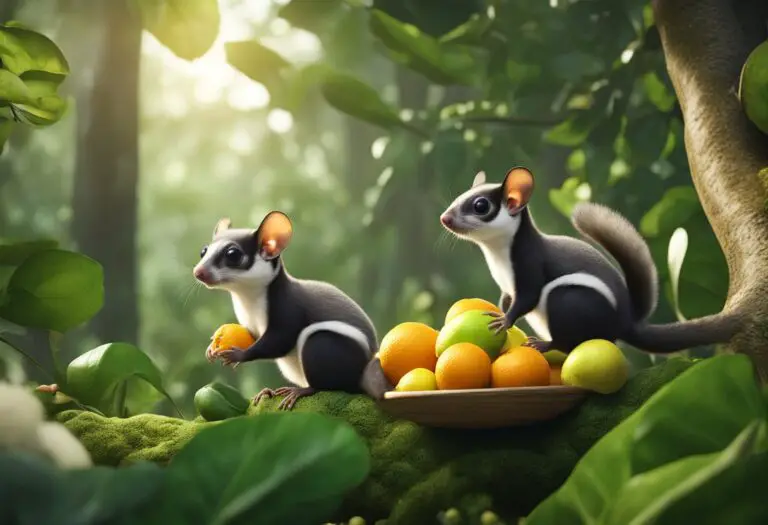Avoiding Toxic Foods for Sugar Gliders
Did you know that sugar gliders, those adorable marsupial pets, are susceptible to a range of toxic foods that can be harmful or even fatal to their health? With the growing popularity of these unique animals as pets, it’s crucial for owners to be aware of the specific dietary needs and potential dangers they may face. This article will explore the key considerations for providing a safe and balanced diet for sugar gliders, helping to ensure their health and wellbeing.
Sugar gliders are becoming increasingly popular as exotic pets, with their captivating appearance and playful personalities capturing the hearts of many. However, their specific dietary requirements and the potential for toxic foods to cause harm are often overlooked by new pet owners. By understanding the sugar glider diet, safe foods for sugar gliders, toxic plants for sugar gliders, feeding sugar gliders, sugar glider nutrition, sugar glider care, exotic pet care, marsupial pets, and Australian pets, pet owners can ensure their beloved companions thrive in their care.
Understanding Sugar Glider Dietary Needs
Sugar gliders are omnivorous animals, meaning they require a diverse diet that includes both plant-based and animal-based foods. These unique marsupial pets found in Australia have a wide-ranging diet in the wild, consisting of a variety of fruits, vegetables, insects, and even small prey. Providing a balanced diet is crucial for sugar gliders, as it ensures they receive all the necessary nutrients for their overall health and wellbeing.
Omnivorous Nature of Sugar Gliders
As omnivorous creatures, sugar gliders thrive on a diverse array of food sources. In their natural habitat, they may forage for nectar, pollen, sap, and a variety of insects, as well as small birds, eggs, and even small rodents. This diverse diet allows sugar gliders to obtain the essential proteins, carbohydrates, fats, vitamins, and minerals required for their growth and overall well-being.
Importance of a Balanced Diet
Maintaining a balanced sugar glider diet is critical for ensuring these marsupial pets receive all the necessary nutrients for their health and longevity. An imbalanced diet can lead to various health issues, such as metabolic disorders, weakened immune systems, and even organ dysfunction. By understanding the specific dietary needs of sugar gliders, pet owners can create a comprehensive feeding plan that caters to their unique nutritional requirements.
Toxic Foods to Avoid for Sugar Gliders
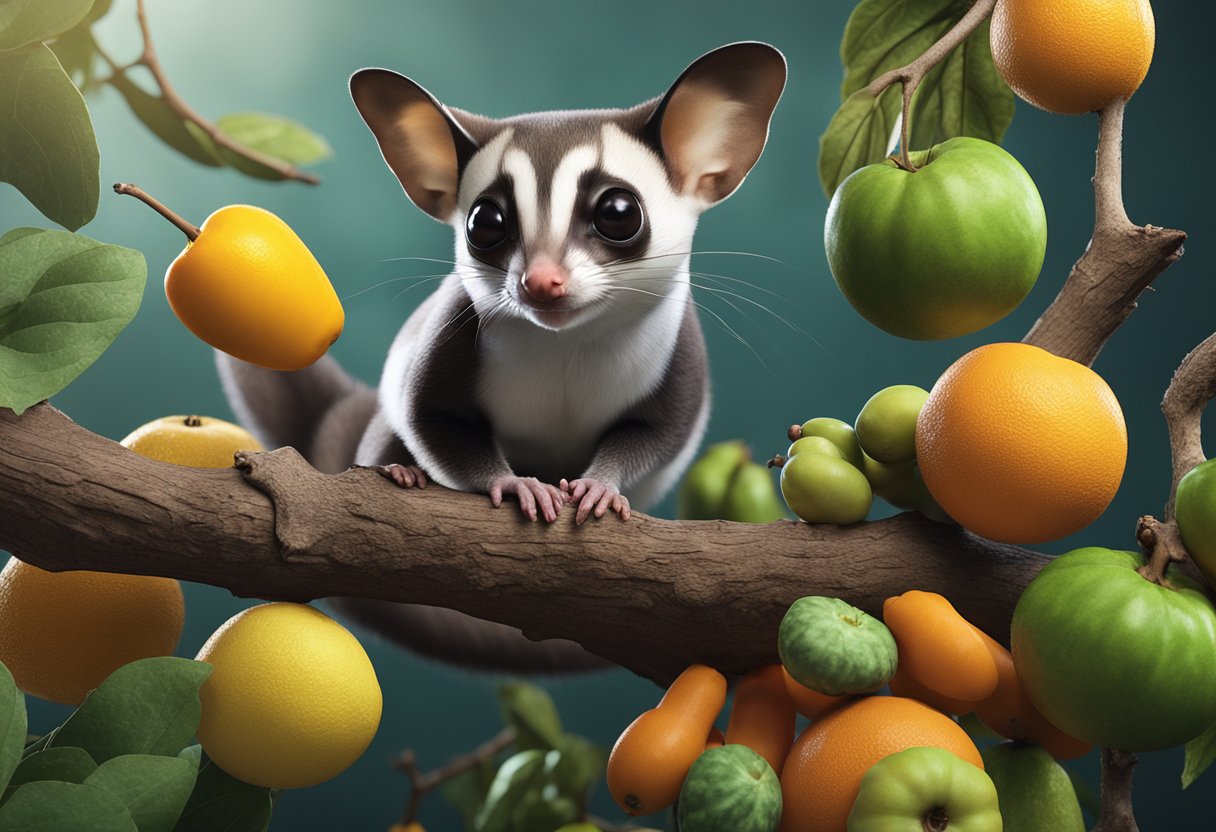
While sugar gliders can enjoy a wide variety of foods, there are certain items that can be highly toxic and should be strictly avoided. Two of the most well-known toxic foods for these unique marsupial pets are avocados and chocolate.
Avocados and Chocolate
Avocados contain a compound called persin, which can be harmful or even fatal to sugar gliders. Similarly, chocolate contains theobromine, a stimulant that can have severe negative effects on the health and behavior of these small animals. Pet owners must ensure that avocados and chocolate are kept far away from their sugar gliders to prevent any accidental ingestion.
Caffeinated and Alcoholic Beverages
In addition to toxic foods, caffeinated and alcoholic beverages should never be given to sugar gliders. These types of drinks can have severe negative impacts on the health and wellbeing of these exotic pets, potentially leading to agitation, heart problems, and other life-threatening conditions. Responsible sugar glider owners must strictly avoid providing any caffeinated or alcoholic products to their beloved companions.
Avoiding Toxic Foods for Sugar Gliders
Keeping sugar gliders safe from toxic foods is a crucial aspect of their care. As these unique marsupial pets have become increasingly popular, it’s essential for pet owners to understand which foods to avoid and provide a well-balanced diet to ensure their health and wellbeing. This section will delve deeper into the specific toxic foods that should be kept away from sugar gliders.
One of the most well-known toxic foods for sugar gliders is avocado. This fruit contains a compound called persin, which can be highly toxic to these animals and can lead to serious health issues, including gastrointestinal problems and even death. Similarly, chocolate is another food that should be strictly avoided, as it contains methylxanthines that can be harmful to sugar gliders.
In addition to avocados and chocolate, sugar gliders should also steer clear of caffeinated and alcoholic beverages. These types of beverages can have severe negative effects on the health and behavior of sugar gliders, and can lead to issues such as hyperactivity, seizures, and even organ damage.
By understanding the specific toxic foods that can harm sugar gliders, pet owners can take the necessary precautions to keep these beloved animals safe and healthy. Providing a well-balanced diet and avoiding any potentially dangerous foods is crucial for the long-term wellbeing of sugar gliders.
Safe Fruits and Vegetables for Sugar Gliders
While there are certain foods that sugar gliders should avoid, these unique marsupial pets can enjoy a variety of safe and nutritious fruits and vegetables. Providing a balanced diet that incorporates these healthy options is crucial for supporting the overall wellbeing of sugar gliders.
Nutrient-Rich Options
Some of the best fruit and vegetable choices for sugar gliders include blueberries, apples, carrots, and leafy greens. These nutrient-rich foods are packed with essential vitamins, minerals, and fiber that can help support a sugar glider’s immune system, promote healthy digestion, and contribute to their vibrant coat and energetic lifestyle.
Moderation is Key
While sugar gliders can safely enjoy a variety of fruits and vegetables, it’s important to remember that even these healthy foods should be provided in moderation. An imbalanced diet, even one that includes safe ingredients, can lead to health issues for these delicate marsupials. Pet owners should carefully monitor portion sizes and rotate different safe options to ensure their sugar gliders receive a well-rounded and nutritious diet.
| Safe Fruits for Sugar Gliders | Safe Vegetables for Sugar Gliders |
|---|---|
| Blueberries, Apples, Bananas, Melons, Peaches | Carrots, Leafy Greens (Kale, Spinach), Sweet Potatoes, Broccoli, Bell Peppers |
Protein Sources for Sugar Gliders
In addition to a diverse array of fruits and vegetables, sugar gliders require a reliable source of protein in their diet. In their natural habitat, these unique marsupials may consume a variety of insects, small prey, and even some lean meats. When caring for sugar gliders as pets, it is essential to provide a balanced protein source that caters to their nutritional needs.
Insects and Lean Meats
One of the most suitable protein options for sugar gliders is a selection of insects, such as mealworms and crickets. These nutrient-dense invertebrates can be a valuable addition to the sugar glider diet, offering a range of essential amino acids and other beneficial nutrients. Additionally, lean meats, like cooked chicken or turkey, can be introduced in moderation to supplement the sugar glider’s nutrition.
It is important to note that the sugar glider’s care should involve a balanced diet that encompasses a variety of protein sources, along with the appropriate fruits, vegetables, and dietary supplements. By providing a well-rounded sugar glider diet, pet owners can ensure their beloved marsupial pets receive the necessary nutrients for optimal health and longevity.
Sugar Glider Dietary Supplements
While a well-balanced diet can provide most of the necessary nutrients for sugar gliders, there may be instances where dietary supplements are required. Calcium and vitamin supplements, in particular, can be beneficial in ensuring that sugar gliders receive all the essential vitamins and minerals they need.
Calcium and Vitamin Supplements
Sugar gliders have specific nutritional requirements, and a lack of certain nutrients can lead to health issues. Calcium is crucial for strong bones and teeth, while vitamins like A, B, and D are important for overall health and immune function. Supplementing a sugar glider’s diet with high-quality calcium and vitamin supplements can help fill any potential gaps and promote optimal well-being.
When selecting supplements, it’s important to choose products that are specifically formulated for sugar gliders or other small exotic pets. These supplements are designed to provide the appropriate balance of nutrients in the correct dosages. It’s always best to consult with a veterinarian specializing in sugar gliders or exotic animal care to determine the most suitable supplement regimen for your pet.
Properly incorporating supplements into a sugar glider’s diet can be a valuable addition to their overall care. By ensuring they receive all the essential nutrients, pet owners can help support the long-term health and happiness of their beloved sugar gliders.
Creating a Balanced Diet Plan
Providing a balanced and varied diet is crucial for the health and wellbeing of sugar gliders. By creating a comprehensive diet plan that includes a mix of safe fruits, vegetables, proteins, and supplements, pet owners can ensure their sugar gliders receive all the necessary nutrients for optimal growth and development.
Variety and Portion Control
When designing a sugar glider’s diet, it’s important to offer a diverse selection of safe foods to prevent nutritional deficiencies. This includes incorporating a variety of fruits like blueberries, apples, and melons, as well as vegetables such as carrots, leafy greens, and sweet potatoes. Portion control is also key, as even healthy foods should be provided in moderation to maintain a balanced sugar glider diet.
Consulting with Veterinarians
While pet owners can play a significant role in designing a sugar glider’s nutrition plan, it’s crucial to consult with experienced veterinarians who specialize in exotic pet care. These professionals can provide guidance on the specific dietary needs of marsupial pets, recommend appropriate supplements, and help ensure the overall care of these unique Australian pets.
By following these guidelines and working closely with veterinary experts, pet owners can create a balanced and varied diet that meets the unique nutritional requirements of their beloved sugar gliders.
Signs of Toxicity and Immediate Action
Despite the best efforts to provide a safe and balanced diet, there is always a possibility that a sugar glider may accidentally consume a toxic food. As responsible pet owners, it is crucial to be able to recognize the signs of toxicity and take immediate action to address the situation. This section will outline the common symptoms of food poisoning in sugar gliders and provide guidance on seeking prompt veterinary care to ensure the animal’s safety and recovery.
Recognizing Symptoms
When a sugar glider has ingested a toxic substance, the signs can vary depending on the type and amount of the offending food. Common symptoms to watch for include vomiting, diarrhea, lethargy, loss of appetite, and changes in behavior. In more severe cases, the sugar glider may exhibit neurological symptoms such as tremors, seizures, or difficulty breathing. It is essential to act quickly if any of these signs are observed, as a delay in treatment can have potentially fatal consequences for these delicate marsupial pets.
Seeking Veterinary Care
If a sugar glider is suspected of consuming a toxic food, it is imperative to seek immediate veterinary attention. The veterinarian will be able to properly diagnose the issue, provide appropriate treatment, and monitor the animal’s recovery. They may recommend inducing vomiting, administering activated charcoal, or providing supportive care, depending on the specific situation. Early intervention and professional medical care are crucial for the best possible outcome when a sugar glider faces a toxic food emergency.
Maintaining a watchful eye for any signs of toxicity and being prepared to act quickly can help ensure the safety and wellbeing of these unique marsupial pets. By understanding the potential risks and taking the necessary precautions, sugar glider owners can enjoy the companionship of these adorable australian pets while prioritizing their exotic pet care.
Conclusion
Providing a safe and balanced diet is essential for the health and wellbeing of sugar gliders. By understanding their dietary needs, avoiding toxic foods such as avocados and chocolate, and incorporating a variety of safe fruits, vegetables, proteins, and supplements, pet owners can ensure their sugar gliders thrive. Remember, consulting with veterinarians and being vigilant for signs of toxicity are also crucial steps in keeping these unique marsupial pets from Australian pets safe and happy.
The key to maintaining a healthy sugar glider diet is to prioritize a well-rounded sugar glider nutrition plan that caters to their exotic pet care needs. By focusing on providing a diverse and balanced diet, pet owners can help their sugar gliders live long, fulfilling lives as beloved australian pets.
Ultimately, the health and happiness of sugar gliders depend on the diligence and care of their pet owners. By staying informed, making informed choices, and seeking professional guidance, sugar glider owners can ensure these unique creatures receive the proper sugar glider care they require. With the right approach, sugar gliders can thrive and bring endless joy to their loving caretakers.
